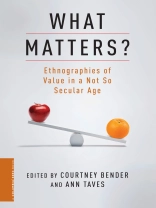Over the past decade, religious, secular, and spiritual distinctions have broken down, forcing scholars to rethink secularity and its relationship to society. Since classifying a person, activity, or experience as religious or otherwise is an important act of valuation, one that defines the characteristics of a group and its relation to others, scholars are struggling to recast these concepts in our increasingly ambiguous, pluralistic world.
This collection considers religious and secular categories and what they mean to those who seek valuable, ethical lives. As they investigate how individuals and groups determine significance, set goals, and attribute meaning, contributors illustrate the ways in which religious, secular, and spiritual designations serve as markers of value. Reflecting on recent ethnographic and historical research, chapters explore contemporary psychical research and liberal American homeschooling; the work of nineteenth and early-twentieth-century American psychologists and French archaeologists; the role of contemporary humanitarian and volunteer organizations based in Europe and India; and the prevalence of highly mediated and spiritualized publics, from international psy-trance festivals to Ghanaian national political contexts. Contributors particularly focus on the role of ambivalence, attachment, and disaffection in the formation of religious, secular, and spiritual identities, resetting research on secular society and contemporary religious life while illuminating what matters in the lives of ordinary individuals.
Spis treści
Introduction: Things of Value
From a Materialist Ethic to the Spirit of Prehistory
Conquering Religious Contagions and Crowds: Nineteenth-Century Psychologists and the Unfinished Subjugation of Superstition and Irrationality
Religious and Secular, 'Spiritual’ and 'Physical’ in Ghana
Volunteer Experience
Secular Humanitarianism and the Value of Life
Homeschooling the Enchanted Child: Ambivalent Attachments in the Domestic Southwest
Mind Matters: Esalen’s Sursem Group and the Ethnography of Consciousness
Tribalism, Experience, and Remixology in Global Psytrance Culture
Acknowledgments
Contributors
Index
O autorze
Courtney Bender, associate professor of religion at Columbia University, is the author of The New Metaphysicals: Spirituality and the American Religious Imagination, winner of the 2011 AAP PROSE Award for Excellence in Scholarly Publishing in Theology/Religious Studies, and coeditor, with Pamela Klassen, of After Pluralism: Reimagining Models of Interreligious Engagement.Ann Taves is professor of religious studies at the University of California, Santa Barbara, and past president of the American Academy of Religion. Her most recent books include Religious Experience Reconsidered: A Building Block Approach to the Study of Religion and Other Special Things, winner of the 2010 Distinguished Book Award from the Society for the Scientific Study of Religion, and Fits, Trances, and Visions: Experiencing Religion and Explaining Experience from Wesley to James, winner of the 2000 Association of American Publishers Award for Best Professional/Scholarly Book in Philosophy and Religion.







![Pokrywa Brian Schrag & Julisa Rowe: Community Arts for God's Purposes [Chinese] 貼近神心意的社群藝術 Pokrywa Brian Schrag & Julisa Rowe: Community Arts for God's Purposes [Chinese] 貼近神心意的社群藝術](https://static.worldofdigitals.com/thumb_webp/740/9781645083740.webp)




